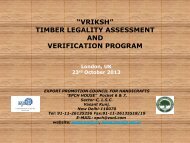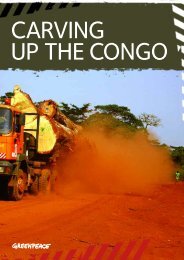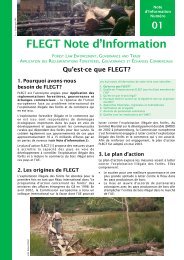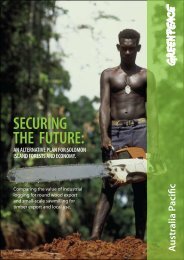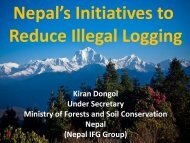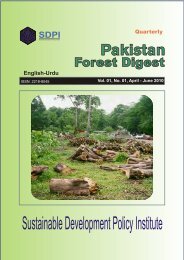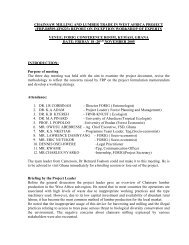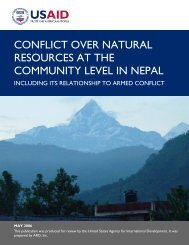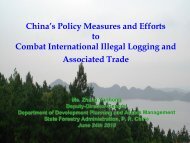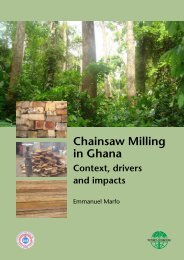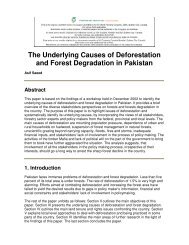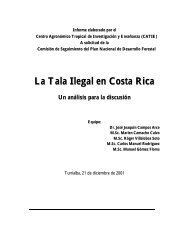download document - Rights and Resources Initiative
download document - Rights and Resources Initiative
download document - Rights and Resources Initiative
- No tags were found...
Create successful ePaper yourself
Turn your PDF publications into a flip-book with our unique Google optimized e-Paper software.
Historical <strong>and</strong> contemporary l<strong>and</strong> laws <strong>and</strong> their impact on indigenous peoples’ l<strong>and</strong> rights in Ug<strong>and</strong>a:The case of the BatwaConvention, 116 the Inter-American Court made an important point on this matter in theSaramaka case. 117 It said that the crucial factor to be considered is whether the restrictionamounts to a denial of the indigenous peoples’ traditions <strong>and</strong> customs in a way that endangersthe very survival of the group <strong>and</strong> of its members. 118 Other st<strong>and</strong>ards set under the Inter-American system are that the restriction must be previously established by law, necessary,proportional, <strong>and</strong> aim to achieve a legitimate objective in a democratic society. 119 Thecontinued survival of an indigenous people should be the guiding principle, <strong>and</strong> should trumpany other reasons for limiting indigenous people’s rights under Article 14 of the ACHPR.In the Constitutional <strong>Rights</strong> Project case, the Commission stated: ‘To permit national law totake precedence over international law would defeat the purpose of codifying certain rights ininternational law <strong>and</strong> indeed, the whole essence of treaty making.’ 120 In this regard,international law should take precedence over Ug<strong>and</strong>a’s l<strong>and</strong> <strong>and</strong> environmental legislations,which limit the Batwa’s l<strong>and</strong> rights to the extent that their protection under internationalhuman rights law is made illusory.5.1 Human rightsInternational human rights law recognises the link between the right to property (l<strong>and</strong>) <strong>and</strong>other rights, including cultural rights. In particular, Indigenous people’s l<strong>and</strong> rights tend to beinextricably linked to their culture, thereby making it pertinent to address this link. Article 27of the ICCPR connotes that ethnic, religious or linguistic minorities shall not be denied theright, in community with the other members of their group, to enjoy their own culture. Dealingwith the right to culture under Article 27 of the ICCPR in the Lansman case, 121 it was stated:The Committee recalls paragraph 7 of its General Comment on article 27, according towhich minorities or indigenous groups have a right to the protection of traditionalactivities such as hunting, fishing … <strong>and</strong> that measures must be taken ‘to ensure effectiveparticipation of members of minority communities in decisions which affect them’.Following the Lansman case is the case of Saramaka peoples v. Suriname, 122 where thesafeguards were laid down. For the state’s action of granting concessions within the territory ofindigenous people not to amount to a denial of their survival, the state must abide by thefollowing: a) it must ensure effective participation of the members of the indigenous peoples in116 See Article 21 (1) of the American Convention on Human <strong>Rights</strong>, OAS Treaty Series No. 36, 1144 UNTS 123,entered into force 18 July 1978, reprinted in Basic Documents Pertaining to Human <strong>Rights</strong> in the Inter-American System, OEA/Ser.L.V/II.82 doc. 6 rev. 1, 1992, p 25.117 Inter-American Court of Human <strong>Rights</strong>, case of Saramaka People v. Suriname, Judgement of 28 November2007.118 Ibid., paragraph 16.119 See Sawhoyamaxa Indigenous Community of the Enxet People v. Paraguay, case 322/2001, Report No.12/03, Inter-American Commission on Human <strong>Rights</strong>, OEA/Ser. L/V/II. 118, doc. 5, rev. 2, 2003.120 Constitutional <strong>Rights</strong> Project, Civil Liberties <strong>and</strong> Media <strong>Rights</strong> Agenda v. Nigeria, African Commission onHuman <strong>and</strong> Peoples <strong>Rights</strong>, paragraph 40.121 The Human <strong>Rights</strong> Committee in Lansman et al. v. Finl<strong>and</strong>, Communication No. 511/1992, UN Doc.CCPR/C/52/D/511/1992 (1994), paragraph 9.5.122 Inter-American Court of Human <strong>Rights</strong>, case of Saramaka People v. Suriname, Judgement of 28 November2007.Nakayi 26January 2009



